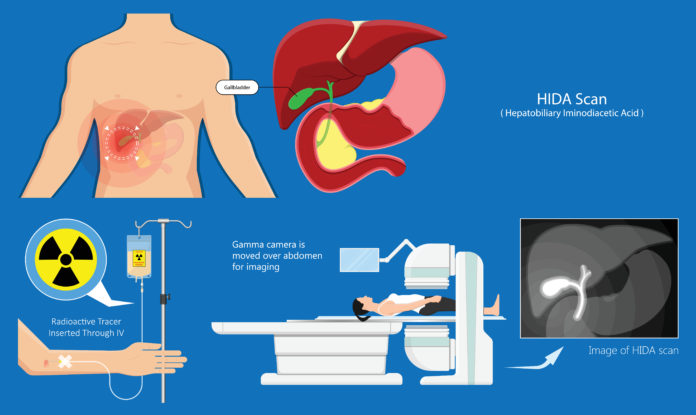Hepatobiliary Iminodiacetic Acid is the full form of hida scan. It is an imaging procedure to diagnose issues in the liver, gallbladder and bile ducts
What is a hida scan?
For a HIDA scan, also called cholescintigraphy and hepatobiliary scintigraphy, a radioactive tracer is injected into the veins of your arms. The injected tracer travels through the bloodstream to your liver, where the cells producing bile take it up. Then the tracer travels with the bile into the gallbladder and through the bile ducts to your small intestine. A gamma camera placed on your abdomen called a gamma camera to track the flow of the tracer and presents it on the screen
You will be advised not to consume anything at least 4 to 5 hours before the HIDA scan, and there should be no medicine intake 12 hours before this scan.
What can be diagnosed with a hida scan?
HIDA scan is conducted to diagnose and evaluate the most common problems related to the gallbladder. It is used to track the flow of bile into your intestine from the liver. This scan also helps in diagnosing several conditions like:
- Liver transplant assessment
- Postoperative complications, like fistulas and bile leaks
- Bile duct obstruction
- To know the cause of pain originating from the right side of the abdomen
- Inflammation in the gall bladder or gallbladder ejection fraction
HIDA scan can also help diagnose the following
- Cholecystitis
- It helps identify if there is an abnormal connection between two organs during complications in operations.
Risks
There are only a few risks involved in the HIDA scan. They are:
- Radiation exposure is a very small risk associated with this scan.
- Bruising at the injection site is also minimal.
- Allergic reaction due to the medication used during the scan is a possible risk.
If you are pregnant or suspect pregnancy, tell your doctor about it because HIDA scans are not performed on breastfeeding or pregnant women.
Hida Scan Preparation
- Medication and Food : Tell your doctor about the foods or drinks you last consumed and the time of intake. The last medication taken is also considered, along with the time it was taken. Fasting for four hours before the test is necessary.
- Personal Items and Clothing : When you arrive at the hospital, you will also be asked to remove jewellery or metal accessories. So, it can be easy for you if you come prepared for this from home. You will then be asked to change into a hospital gown.
Hida Scan Procedure
Before the Procedure
A health professional will be assigned to you who will ask several questions, like the medications you have been taking. He/she will take you inside the room and ask you to lie down on the table and remain in that position throughout the HIDA scan.
During the Procedure:
A specialist will enter a tracer into the vein of your arm. There are chances you may feel a cold sensation when the radioactive tracer is injected.
There will be a technician who will stand near the camera, handling it to capture stomach images. This will be a gamma camera that will take pictures of the tracer injected into your veins to make it easier to visualize the gallbladder.
The radiologist and his/her team will observe the computer screen to see the tracer’s movement in your body. The entire process can take 60 to 90 minutes. In some cases, it can take up to 4 hours. Also, if the original images are not satisfactory, additional imaging within 24 hours might be necessary.
If you feel discomfort, like breathing issues, you can immediately tell your radiologist or technician so that they can take the necessary precautions.
Medication is given based on the situation observed by your doctors. During HIDA scan, you may be administered with an intravenous injection of the drug sincalide (Kinevac) that makes the gallbladder contract and empty. Another drug, morphine is sometimes given during a HIDA scan. This makes the gallbladder easier to visualize.
After the Procedure
In most cases, you will be allowed to go home right after the scan. It is important to drink plenty of water so that the radioactive tracer loses its reactivity within a day in your body and can be eliminated from your body through urine and bowel movements in a day or two. So, drinking lots of water is recommended.
Hida Scan Results
| Results | What the scan shows |
| Normal | This result means the radioactive tracer was able to move from the liver to the gallbladder and small intestine. |
| Slow | This shows that the tracer was only able to move slowly through the body, indicating an obstruction or blockage in the liver. |
| Not present | This result indicates the presence of acute gallbladder inflammation, or acute cholecystitis. |
| Low gallbladder ejection fraction | This result indicates chronic inflammation of the gallbladder, or chronic cholecystitis. |
| Radioactive tracer in other parts of the body | This result indicates the presence of a leak in the body’s bile system. |
Your doctor will check the HIDA scan results, discuss the symptoms, and arrive at a diagnosis based on these results.
Frequently Asked Questions (FAQs)
Should I restrict my diet before the test?
Yes, you will have to fast for four hours before the test.
Can a pregnant woman undergo a HIDA scan?
No, because a radioactive tracer is injected inside the body, breastfeeding or pregnant women must consult their doctors and seek recommendations.
Is HIDA scan more accurate than ultrasound?
HIDA scans have been reported to be more accurate in diagnosing acute cholecystitis, and this scan is observed to have higher sensitivity and accuracy when compared to ultrasound.
Is it normal to feel sick after a HIDA scan?
This depends on how sick the patient feels. It’s always important to discuss any side-effects from the scan with your physician.


















